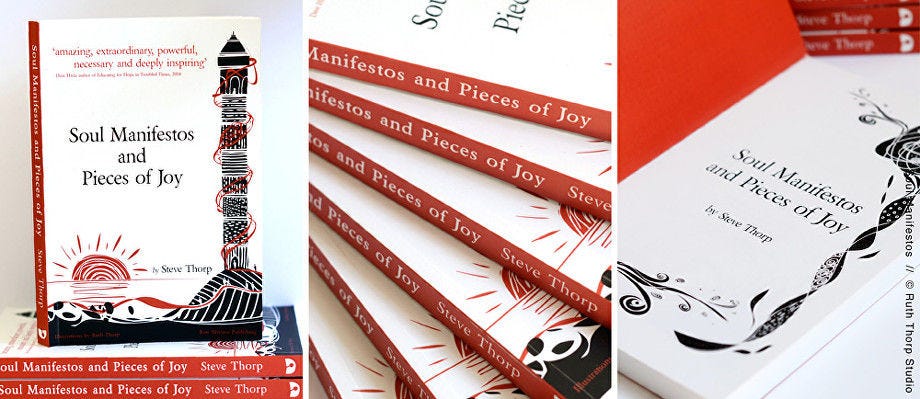
Soul Manifestos 2024 - #02 in a new series
Introduction
In 2014, I published a book of short poetic essays, Soul Manifestos and Pieces of Joy1. The book, illustrated by my longtime collaborator (and daughter) Ruth Thorp, is currently out of print but has continued to be well received over several editions. We are hoping to re-publish it this year, in an anniversary edition with a new end-piece essay to acknowledge the changes in context over the past decade.
These pieces are written in a similar style to the original small essays in the book – short, poetic and personal – and their content also mirrors the concerns that Unpsychology has been addressing in the past decade. You can find the Series Introduction and first ‘chapter’ in this new series HERE.
Soul Manifestos 2024
#02 : A Question of Dying
A spiritual question tugs at us: “Where in the Universe might ‘soul’ reside as we emerge, live and die?”
The answer may have nothing to do with our life on earth, nor have recognisable reference points, even from the most ancient human wisdoms and spiritual traditions. If I was to hazard an answer to this question, I might say that ‘soul’ resides, and is made, only in the present – the eternal now – and that this might be as far as I can get without anthropocentric or devoutly religious speculation, neither of which I wish to embark upon.
What then does ‘good’ dying really mean, if soulmaking is to mean anything within the transcontextual interactions and understandings we will need to address the most urgent tasks facing us?2 There are multiple contexts in which to consider this – here in this precarious, transitional time in human (and other-than-human) history here on Planet Earth.
In any case, these questions arise from pseudo-spiritual assumptions and a turn away from the genocides and trauma through which many humans (and non-humans) die. When I read Stephen Jenkinson’s writings in Die Wise and elsewhere,3 it’s easy to accept the assumption that what we are dealing with is a natural spiritual process – with purpose and meaning – a question with individual and cultural answers. However, sometimes death is something cruelly and brutally inflicted upon individuals and whole communities through the purposeful violence of other humans.
There’s such a contradiction in this – a rupture in the belief that death should be regarded as part of the ‘whole’ and ‘holy’ life task of soul-making. Yet, it’s those who live who get to write words about dying – even if we have suffered along the way. The voices of the dead are always lost to us. We can’t ask them how they feel about it!
Death and dying have always concerned writers, poets, theologians and psychologists. There is a recognition that the end of the individual human self is an important dimension of ‘soulmaking’ (aka spiritual life). However, regardless of everything else that happens around us, the self (social, ecological and original) will cease to exist in a matter of time. All of us, whose experience of existence is held so personally, has to come to terms with and go through this experience.
Here lies the collective, connected complexity of ‘soul’. Whether we regard ‘soul ‘as something real and tangible, or otherwise deeply metaphorical, there is something essential to be faced in the death of our shared experience of life. We are all faced with the inevitability of this ending. Previous civilisations all crumbled and died, much as we as individuals one day will be gone. There are buildings and lost dwelling places – cities even – hidden in the depths of forests, lakes and oceans, covered over by the unrelenting growth of ‘nature’, and the unremitting march of time.
Within this connected experience of the death of self and soul, there are ecological implications, unique to our epoch of human history. Never before have we been faced, as a globally self-conscious species, with the sure knowledge that humans have caused the collapse of the ecosystems that sustain us.
Which humans though? The world is literally controlled by oligarchs, billionaires and neo-liberal corporations, politicians and generals. Furthermore, the decisions to ignore the ravages of climate disaster, and to minimise and deny the colonialist exploitation and genocides that have gone alongside it, have been made in boardrooms, war-rooms and parliaments over the centuries.
This is a stark psychological and political anomaly that separates the majority of humans – largely altruistic, relational, complex creatures that we are – from many of the humans that rule and control us; a society of altruists governed by psychopaths, as George Monbiot has put it.4
Faced with such challenges, we need multiple ways of seeing. We need ‘all kinds of everything’ in terms of relational ‘doing'. That’s why ethical, secular ‘soulmaking’ might be such an essential task – albeit one with many dimensions and contradictions. In such a frame, the challenge of the personal death is brought together with the probable end of the civilisation we have come to experience as ’normal life’. This is a crucial ecological insight that acknowledges an eternal truth, that life and growth depend upon death and decay; and civilisations end and fall just like every spark of life that has ever emerged.
But there is so much grief in this realisation. So much human pain.
This existential truth carries a seed of soul within it – if soul carries the mutuality and humanity of the commons – that also essentially includes other-than-human life. If life is precious – if soulful life is a birthright, then death is both a teacher – “an angel to be wrestled with”, as Stephen Jenkinson might put it5– and an sign that all life is precious, even if its meaning is sometimes opaque and obscure. Mysterious in the sense of not yet being known…
Next time in this series: Soul Manifestos #03 - Soulmaking for broken times
Soul Manifestos and Pieces of Joy written by Steve Thorp and illustrated by Ruth Thorp is a collection of small, poetic essays written against the backdrop of conflict in modern culture, politics, economics, ecology and psychology. The small manifestos are written for wonder, wisdom, joy, love, and openness - and for the common good. They describe an alternative and grounded response to the material world, a way in which we might live our lives with depth and soul. It was first published in 2014 by Raw Mixture Publishing.
“Transcontextual interaction is the recognition that complex systems do not exist in single contexts, but rather are formed between multiple contexts that overlap in living communication and among living systems”, from the International Bateson Institute’s description of Warm Data and Warm Data labs: https://batesoninstitute.org/warm-data-labs/
Die Wise – A Manifesto for Sanity and Soul, is Stephen Jenkinson’s book about grief, and dying, and the great love of life. You can find it - together with his other books and projects at: https://orphanwisdom.com
George Monbiot in in the Guardian, February 2019: https://www.theguardian.com/commentisfree/2019/feb/15/planet-children-protest-climate-change-speech and in a TED talk in July the same year: https://www.thealternative.org.uk/dailyalternative/monbiot-ted2019-politics-of-belonging
“What if your dying is an angel? And what if your dying job, should you choose to accept it, is to wrestle this angel of your dying instead of fighting it? ...Wrestling isn't what happens to you. It is what you do. And you will not be alone in it...Living your way of life wrestles the way life has of being itself: That is how meaning is made...That is what the news of your death could mean: It could mean the beginning, unadorned, common, and singular, of your one true life and its work...” Stephen Jenkinson, Die Wise, North Atlantic Books, 2015.






Beautiful writing. And yes, so much grief.
Maybe if I were a tree, others would listen to my bark.
Maybe if I were a puddle, the children would be less dark.
Maybe if I were a bud, I’d be becoming at every window
Maybe if I were a mute, the world would be wanting.